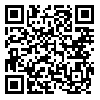Fri, Aug 8, 2025
[Archive]
1- Department of psychiatry, School of Medicine, Fasa University of Medical Sciences, Fasa, Iran , baghban.aida@gmail.com
2- Department of Psychiatry, Shahid Beheshti Hospital, Kerman University of Medical Sciences, Kerman, Iran
3- Nursing Research Center, Razi Faculty of Nursing and Midwifery, Kerman University of Medical Sciences, Kerman, Iran
2- Department of Psychiatry, Shahid Beheshti Hospital, Kerman University of Medical Sciences, Kerman, Iran
3- Nursing Research Center, Razi Faculty of Nursing and Midwifery, Kerman University of Medical Sciences, Kerman, Iran
Abstract: (59 Views)
Background & Objectives: Schizophrenia and bipolar disorder are among the most prevalent psychiatric conditions. Owing to the overlap in symptomatology and clinical manifestations, it is hypothesized that similar underlying dynamics may elicit comparable countertransference reactions in clinicians working with individuals diagnosed with these disorders. Accordingly, the present study undertakes a qualitative exploration of countertransference in clinical interactions with patients diagnosed with schizophrenia presenting positive symptoms and those with bipolar I disorder exhibiting manic and psychotic features.
Materials & Methods: This qualitative study involved psychiatric residents and faculty members at Kerman University of Medical Sciences, with 1 to 30 years of clinical experience, as well as patients admitted to Shahid Beheshti Hospital in Kerman. Patients were interviewed, after which the clinicians’ emotional responses and experiences of countertransference were discussed within a structured focus group session lasting approximately thirty minutes. This process was repeated for multiple selected patients until data saturation was achieved. A conventional content analysis approach was employed to analyze the collected data.
Results: The findings revealed that nineteen distinct emotional responses were elicited during interviews with patients diagnosed with bipolar I disorder with manic and psychotic features, whereas fourteen emotional responses were reported in relation to patients with schizophrenia exhibiting positive symptoms.
Conclusions: The results indicated that feelings of restlessness, happiness, affection, and respect were more prominently evoked in response to patients with schizophrenia exhibiting positive symptoms, whereas intense feelings of anger and rage were more frequently reported in interactions with patients with bipolar I disorder presenting manic and psychotic features. These emotional patterns may thus serve as valuable clinical cues in the differential diagnosis of these two disorders.
Materials & Methods: This qualitative study involved psychiatric residents and faculty members at Kerman University of Medical Sciences, with 1 to 30 years of clinical experience, as well as patients admitted to Shahid Beheshti Hospital in Kerman. Patients were interviewed, after which the clinicians’ emotional responses and experiences of countertransference were discussed within a structured focus group session lasting approximately thirty minutes. This process was repeated for multiple selected patients until data saturation was achieved. A conventional content analysis approach was employed to analyze the collected data.
Results: The findings revealed that nineteen distinct emotional responses were elicited during interviews with patients diagnosed with bipolar I disorder with manic and psychotic features, whereas fourteen emotional responses were reported in relation to patients with schizophrenia exhibiting positive symptoms.
Conclusions: The results indicated that feelings of restlessness, happiness, affection, and respect were more prominently evoked in response to patients with schizophrenia exhibiting positive symptoms, whereas intense feelings of anger and rage were more frequently reported in interactions with patients with bipolar I disorder presenting manic and psychotic features. These emotional patterns may thus serve as valuable clinical cues in the differential diagnosis of these two disorders.
Keywords: Countertransference, Differential diagnosis, Schizophrenia with positive symptoms, Bipolar Type 1, Interview
Send email to the article author
| Rights and permissions | |
 |
This work is licensed under a Creative Commons Attribution-NonCommercial 4.0 International License. |

This work is licensed under a Creative Commons — Attribution-NonCommercial 4.0 International (CC BY-NC 4.0)






